The mastery of the arcane arts is not without its complexities. In Baldur’s Gate 3, upon reaching level two, an enterprising Wizard must make a very important subclass choice between the eight different schools of magic available.
Each comes with its own features, and while they each have pros and cons, there is one that’s too powerful to ignore.
When can you choose your Wizard subclass in BG3?
If you’re wondering when you can choose your Wizard subclass in BG3, it unlocks at level two. You’ll have to get past the tutorial and maybe an additional fight—unless you take out Commander Zhalk—to unlock your subclass. Don’t fret too much, though, since even on the higher difficulty settings, the tutorial isn’t gonna crush you.
What is the best Wizard subclass in BG3?
In general, if you’re playing a Wizard, you will need to consider taking the Abjuration School subclass. If not for you, this is a great choice when making the best Gale build that you can.
Without any other plan, Abjuration allows you to generate a ward that prevents damage for you and, eventually, allies. Abjuration also has some spells that are great to get for a lower cost, like Shield, Counterspell, and Dispel Magic.
BG3 Wizard subclasses ranked
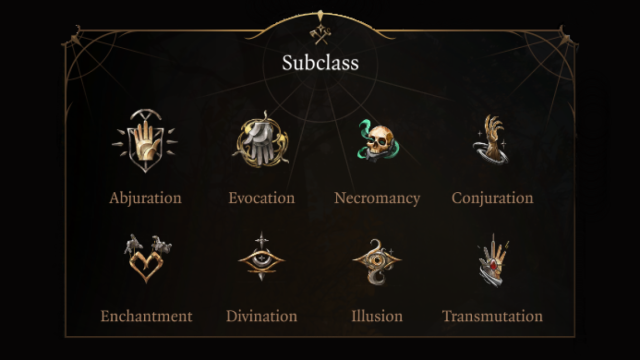
That being said, while we are adamant that Abjuration is the best Wizard subclass in BG3 for builds without a game plan, the other subclasses certainly have merit. Each has its benefits, making their attributed spell school much less expensive to learn from. Here’s our ranking!
8) Illusion
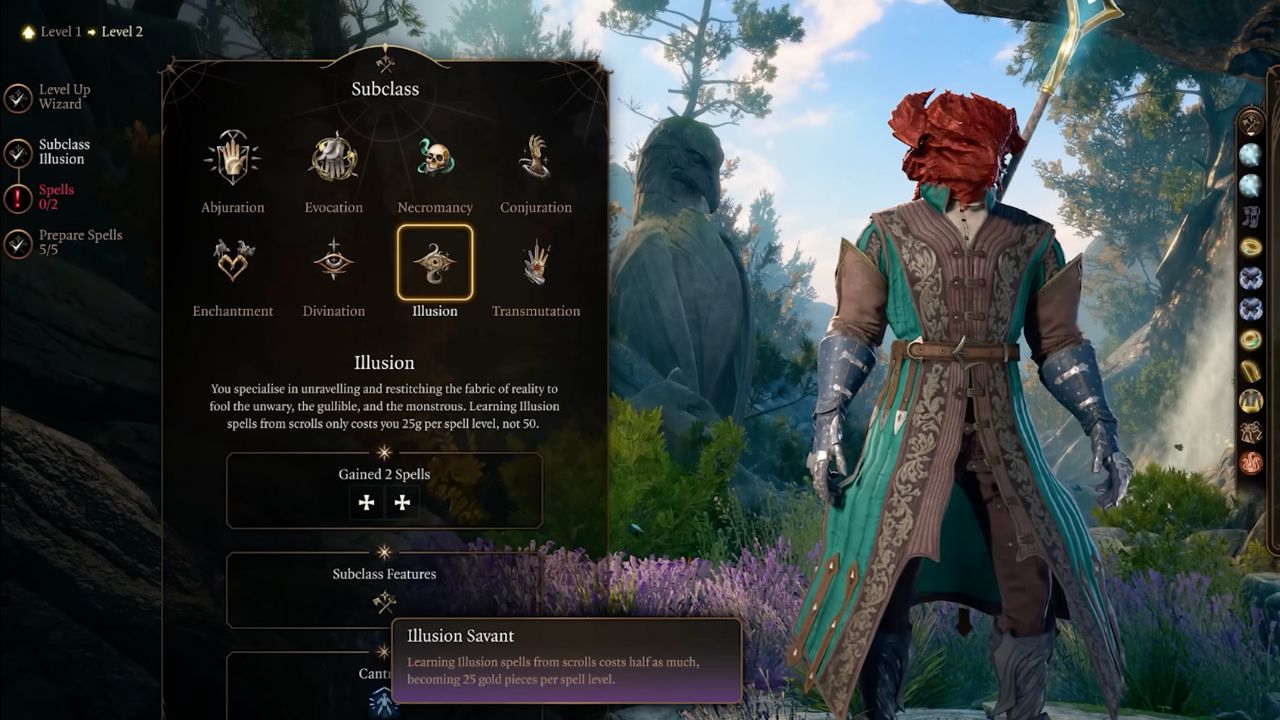
Somebody’s gotta be at the bottom, and sadly, it’s Illusion. While very fun, the abilities granted by the Illusion subclass don’t mesh perfectly with the game as a whole. You basically need to be given the instances to use Illusion magic to make things like Improved Minor Illusion worthwhile.
Otherwise, you’re relying on the AI to do what you want and not randomly notice you. Certainly not a waste of time, especially if you want to try and pick the game apart! But if it’s your first run and you’re not too sure what everything does yet, maybe sit this one out.
7) Enchantment
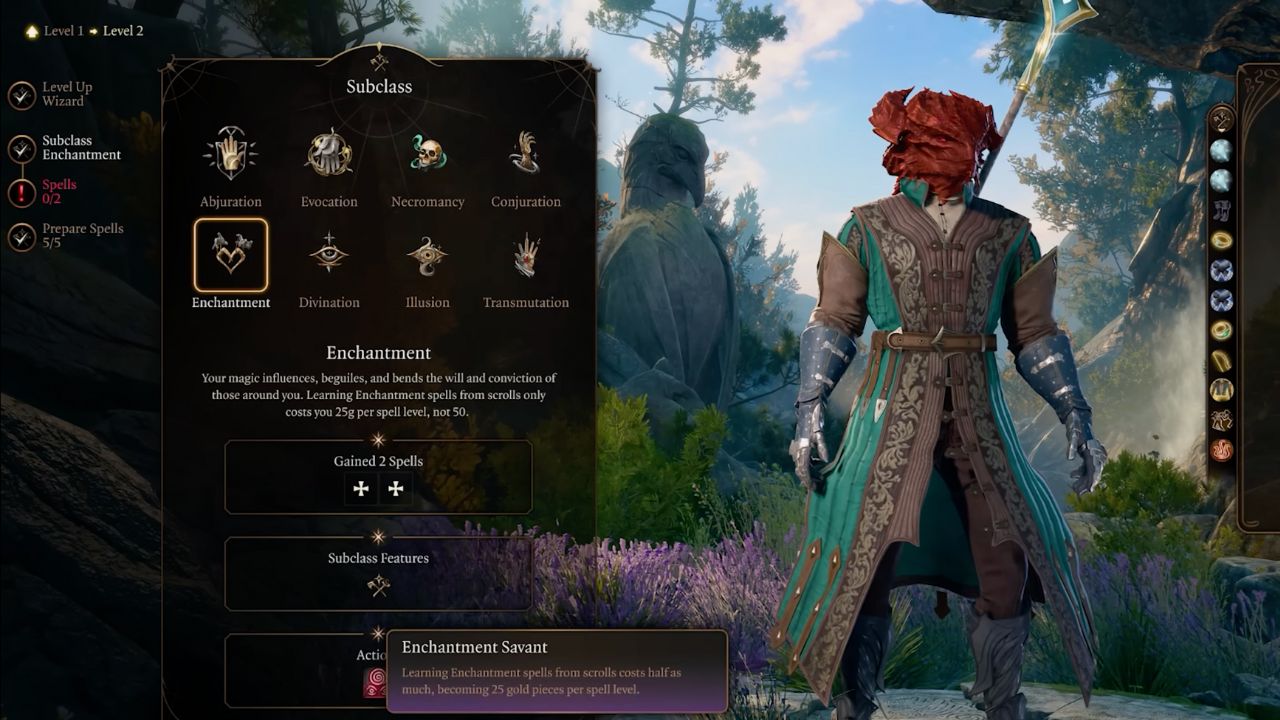
We’re now onto a school that does great things but has some awkward parts to it. Enchantment is a heavy status effect school of spells, all of which can be useful. Hypnotic Gaze is a powerful ability that can lock someone out of a fight… As long as you’re locked out of the fight, too.
Instinctive Charm is a great ability, but you probably don’t want to be targeted for attacks in the first place. Again, it’s not bad, but it requires careful planning and specific scenarios. Not to mention, you’ll sometimes target something immune to charmed!
6) Evocation
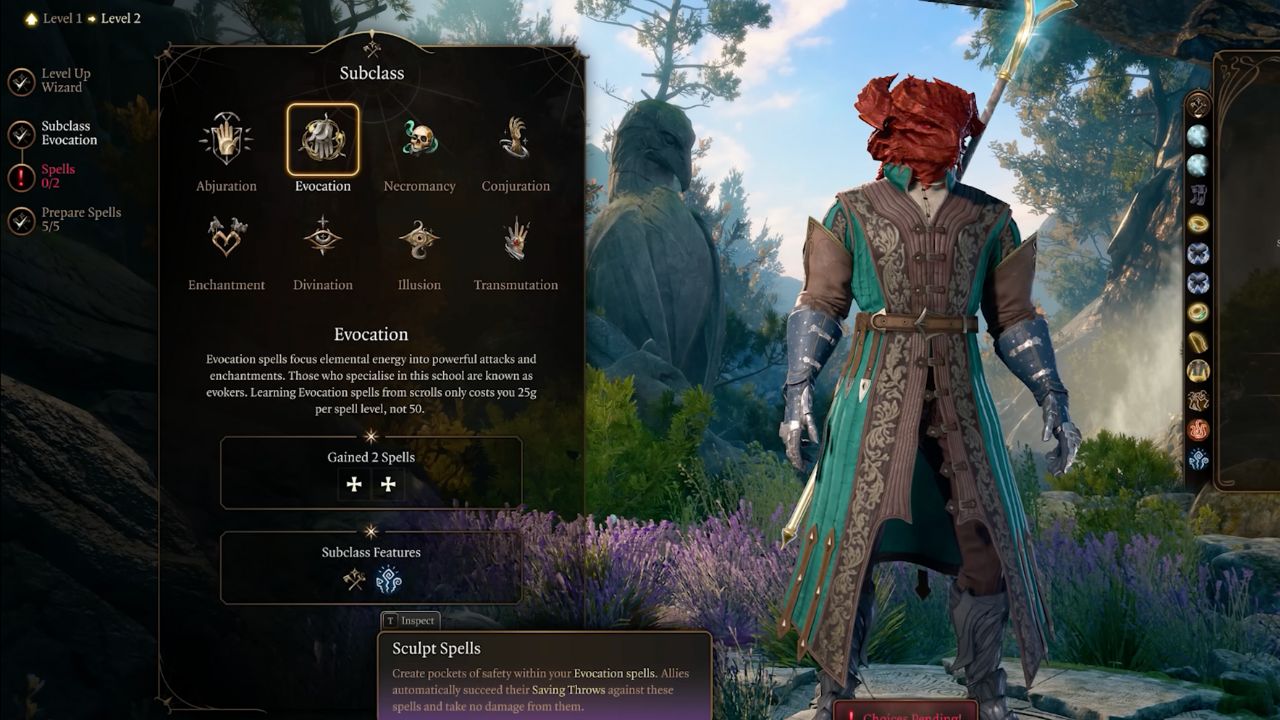
Of all the spell schools, Evocation has the most numerous options for spells. Fireball, Burning Hands, Lightning Bolt… all will be available for you at a reduced cost. However, the school’s features are pretty simple. Sculpt Spells is a strong ability for hectic fights, but you can avoid using this ability altogether with careful placement and coordination. Potent Cantrip lets you halve a Saving throw cantrip, but not an attack roll one. Empowered Evocation is very solid but is only available during the endgame romp.
This is a fine option if your goal is to be a pure combat wizard. However, if you want to do anything except damage, you have bigger fish to fry. While you might decide it’s not the best for you, it’s one of the best subclasses for Gale if you’ve got him tagging along as your party’s dedicated wizard.
5) Conjuration
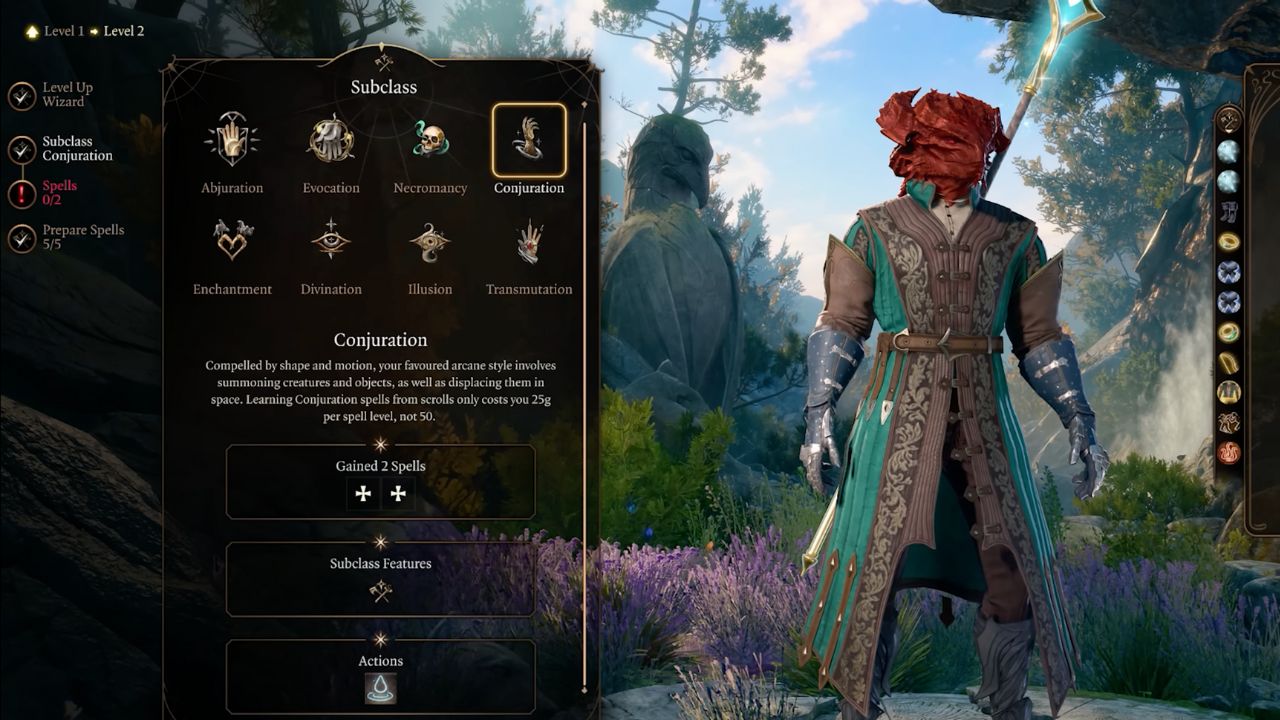
Conjuration spells are especially common in 5E and BG3, making this a good money saver. In addition, its abilities are pretty fine. You gain the ability to Create Water whenever you like, which is a lifesaver when faced with fiery situations. Benign Transposition is a sound get-out-of-jail card, and Focused Conjuration allows you to ignore concentration almost entirely. All around, it has a good mixture of utility abilities.
4) Transmutation
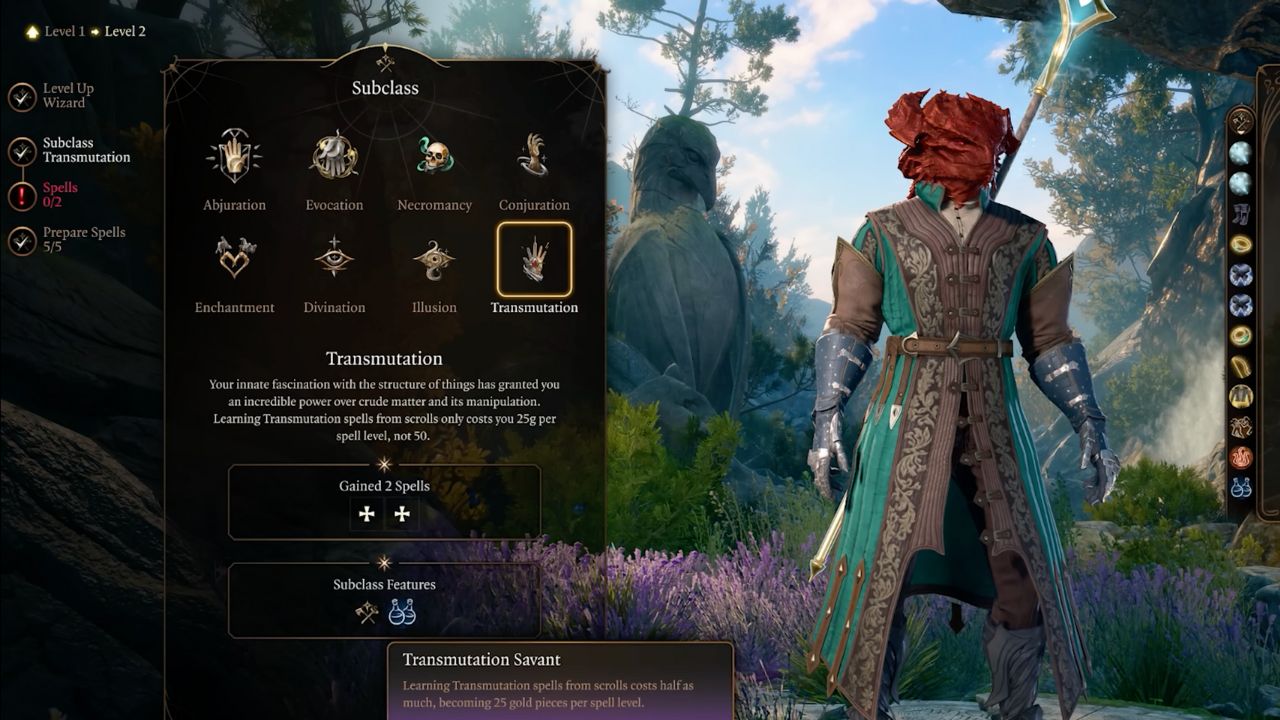
Transmutation is unique in BG3 compared to 5E in that the Experimental Alchemy ability is really, really cool. This feature quite literally makes you money if you can land Medicine checks! Transmuter’s Stone and Shapechanging also offer you—and your party, as the case is for the Stone—quite a few unique buffs that most classes and spells miss out on, making it a very solid problem-solving archetype!
3) Divination
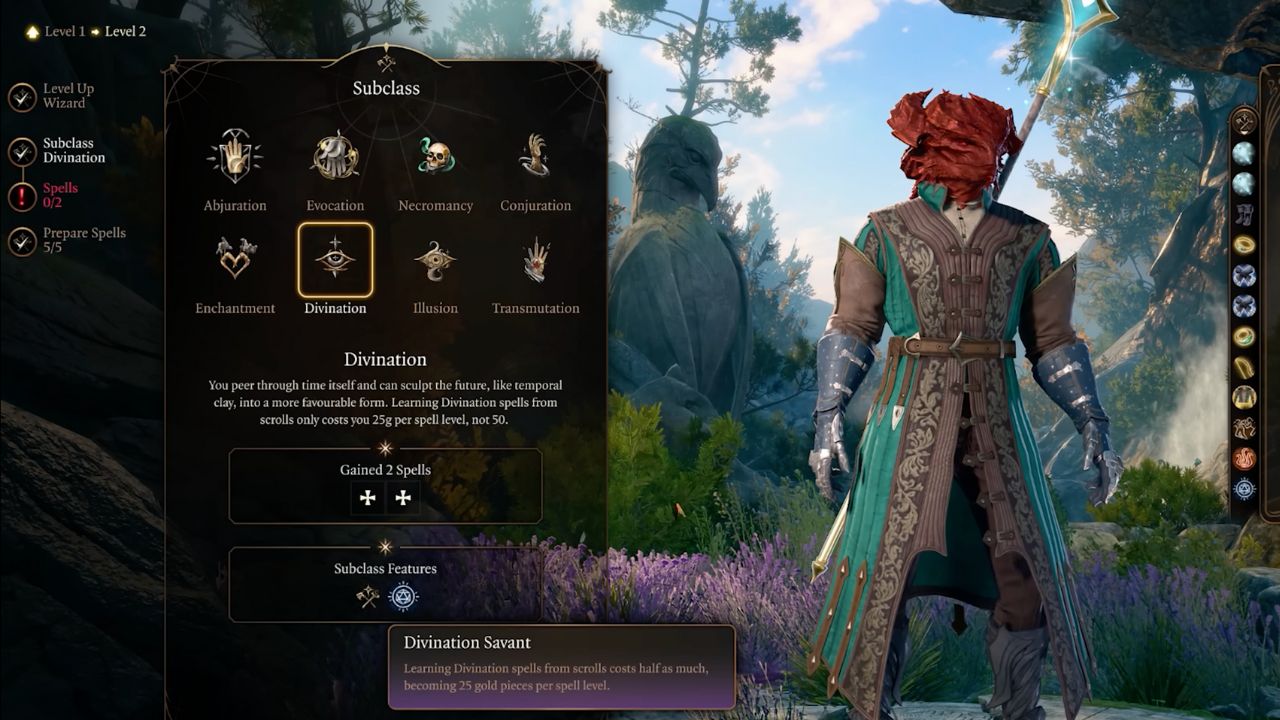
I want to meet the 5E designer who created the Portent ability and shake their hand. The Divination Wizard gets to influence attack rolls and saving throws rolled near them by replacing them with Portent Dice.
These dice are rolled earlier, so you immediately know if you have high or low rolls. The ability to directly alter the fate of yourself and your allies is strong. Altering the fate of your enemies as well is ridiculous. All on Reactions, all without saves! It’s just a shame that the Divination spell pool is a little lacking.
2) Necromancy
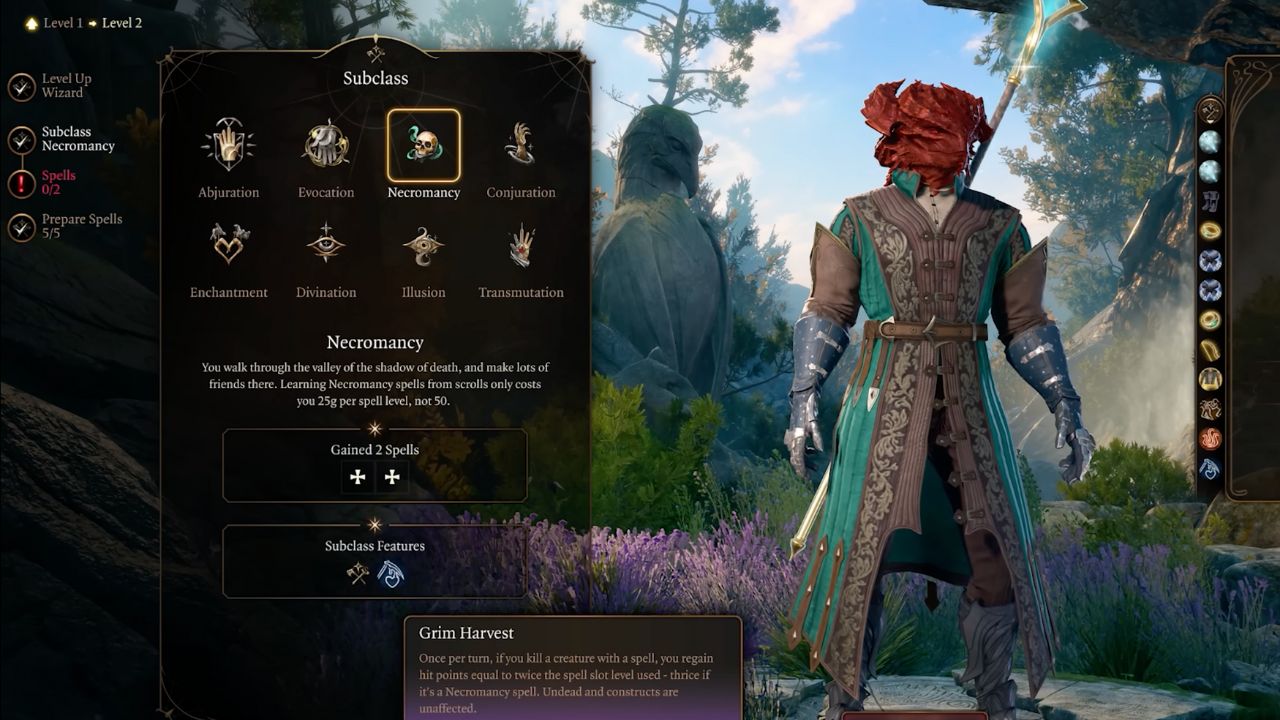
Necromancy has the opportunity to completely crack the game in two. While all Wizards can theoretically summon, you must reach level six on the Necromancy school to raise the dead as your servants. In addition, you’re even better at it than most casters who can do it naturally! An army of zombies might not sound very impactful, but a shot at a Skeleton is a shot that does not hit you.
And, as you’ve learned, if you ever fought Commander Zhalk, even small attack rolls can take out a high-level enemy if you swing often enough! Your other benefits, being a small heal on kill, resistance to necrotic damage, and rare HP-lowering attacks, are worth noting for their defensive applications.
1) Abjuration
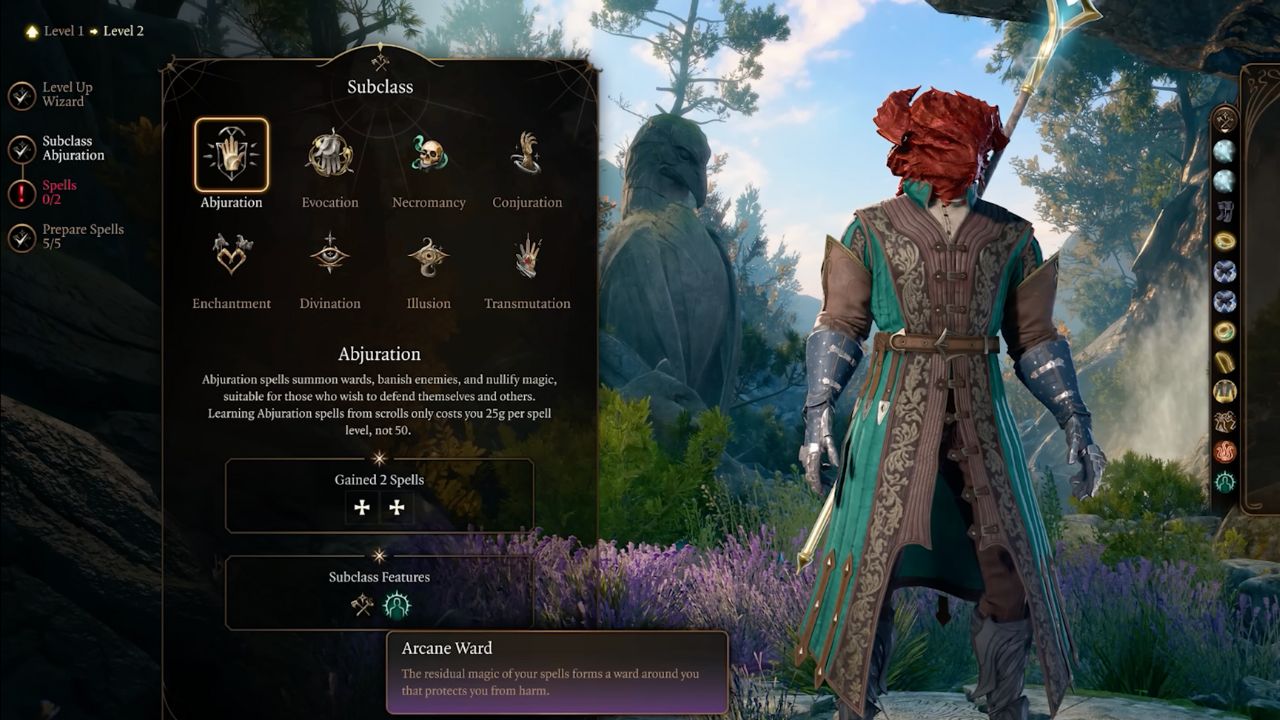
In the number one spot is the Abjuration subclass. The Arcane Ward of Abjuration is a huge reason to pick the subclass, but we do want to emphasize the importance of Abjuration as a spell school. A lot of the Wizard’s unique utility lies in this spell school. Learning spells like Dispel Magic and Counterspell off of scrolls is pretty important. The Ward itself has a solid HP pool and can consistently soak hits.
Spells like Shield also restore its HP, giving you a source of “healing.” Over time, the Ward strengthens and can support allies instead of just yourself, turning you into a pool of HP that the party shares. And, since the Ward takes the damage, you might not have any healing to do afterward. Whatever your Wizard build, a healthy dose of Abjuration certainly doesn’t hurt.
Best Wizard subclass for beginners in BG3
Abjuration is the best Wizard subclass for beginners in BG3 because it offers the most defensive abilities. On top of this, you can get healing, buffing, and crowd-controlling abilities. This means you have a better chance of surviving and healing if you’re hurt and can help sustain yourself and your team.
Even if you’re not new to BG3 or the Wizard class, Abjuration is also the best Wizard subclass to take into the Tactician difficulty because the defensive and healing abilities are crucial in surviving more of the more challenging, late-game bosses.
However, the Conjuration subclass holds a special place in my heart because I enjoy playing summoner classes. Being able to summon creatures who can deal damage and be a tank of sorts can also give your team a greater advantage, especially if you have squishy teammates. And if you’re not confident in your abilities or how the dice roll system works, it can be a nice layer of defense.
But overall, the Abjuration Wizard subclass won’t steer you wrong, and if you want to try something else, you can always take abilities from the other subclasses. They’ll just cost you more gold.
Others Asked
Why is the Monk class considered unique in Baldur's Gate 3?
The Monk class is considered unique in Baldur's Gate 3 because players don’t have access to it via a companion, meaning they have to maximize their potential using the Monk's subclass.
What unique feature does Baldur's Gate 3 offer to its players?
Baldur's Gate 3 allows players to do practically anything and everything they want, including killing important characters in the game’s story.
What benefits do subclasses provide for characters in Baldur's Gate 3?
Subclasses boost a character's offensive, defensive, and utility stats, providing between two and four extra class abilities.





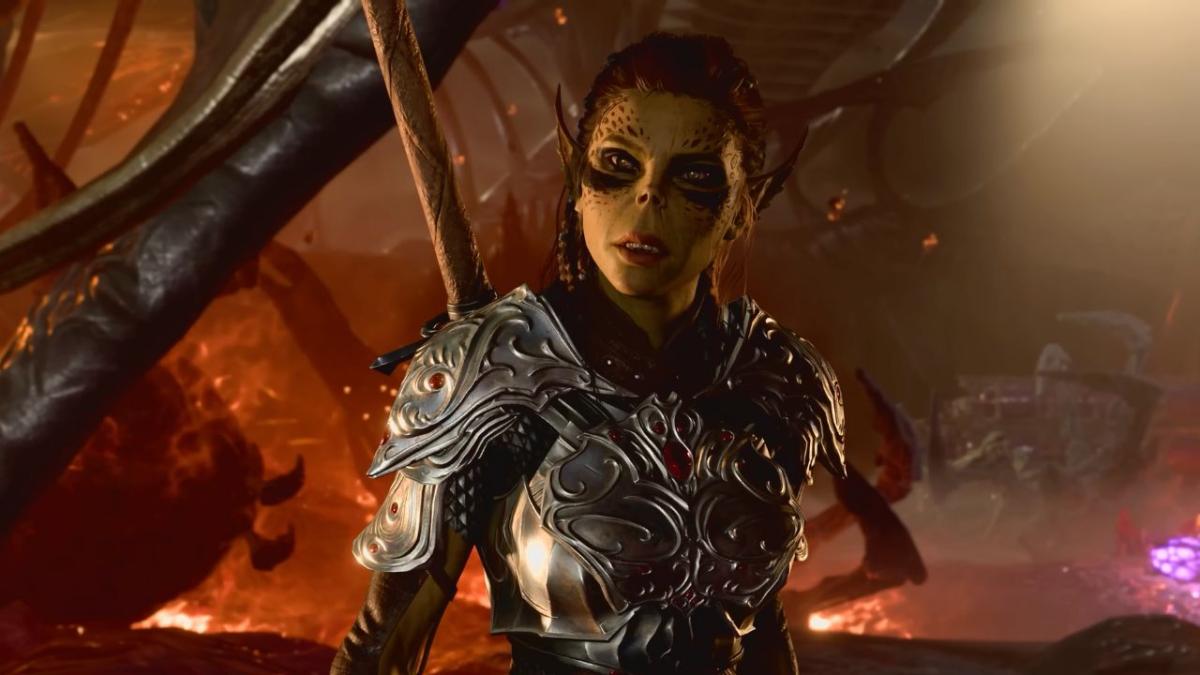



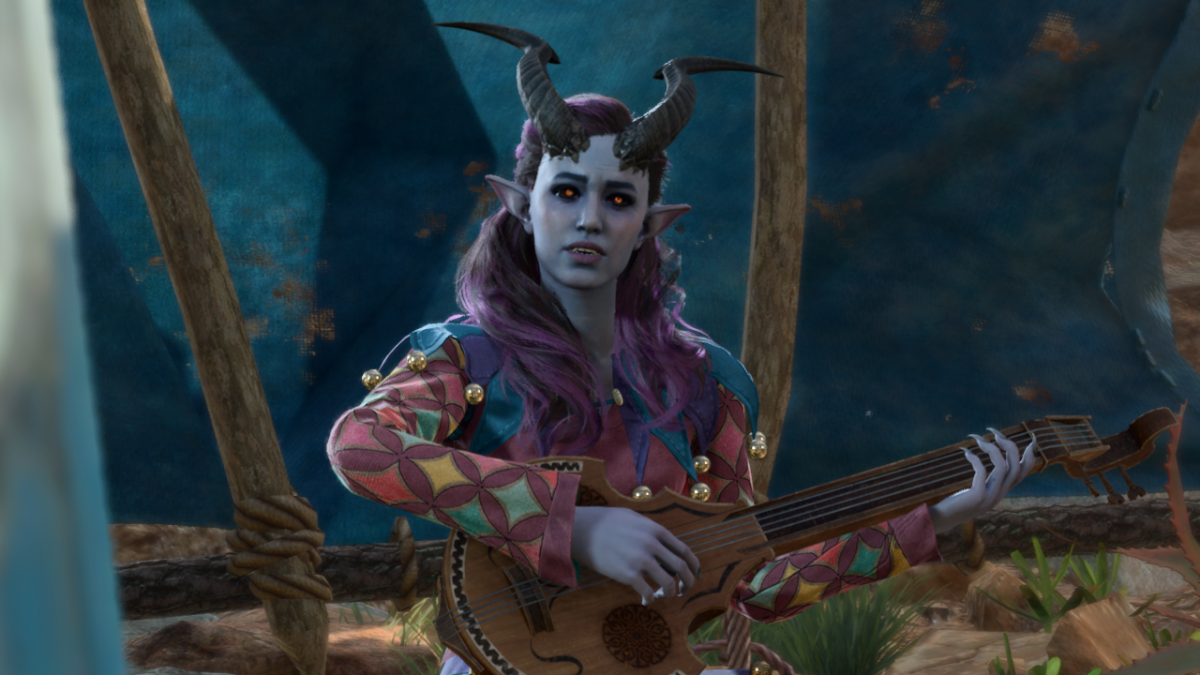
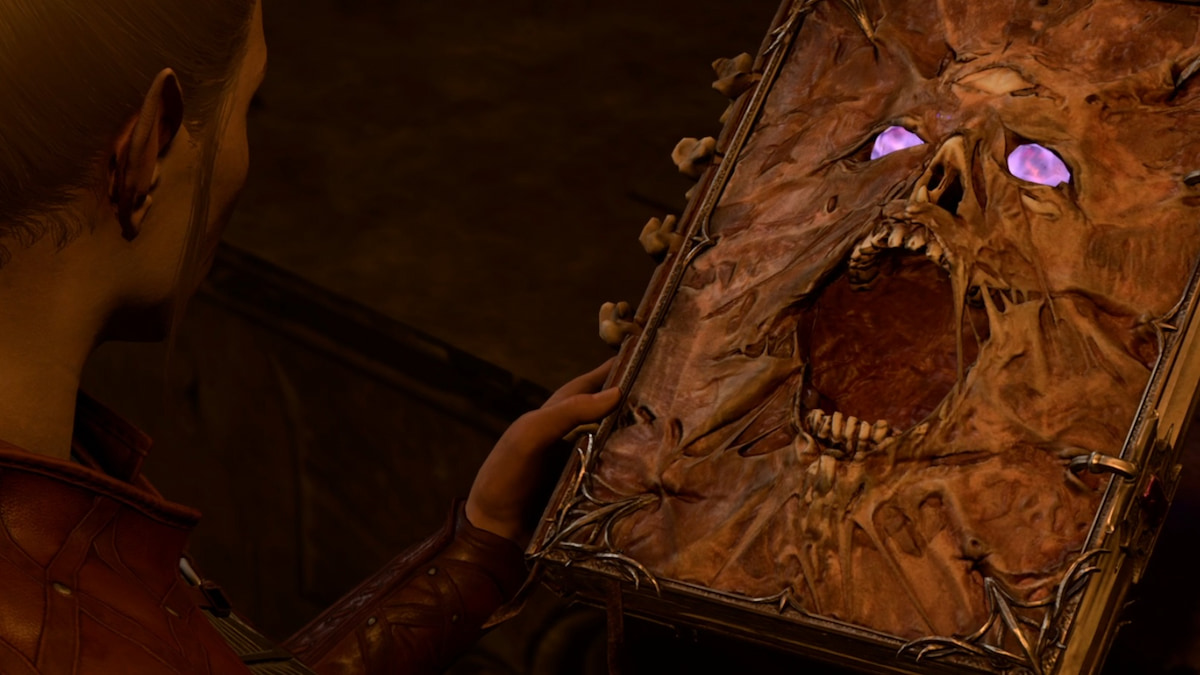


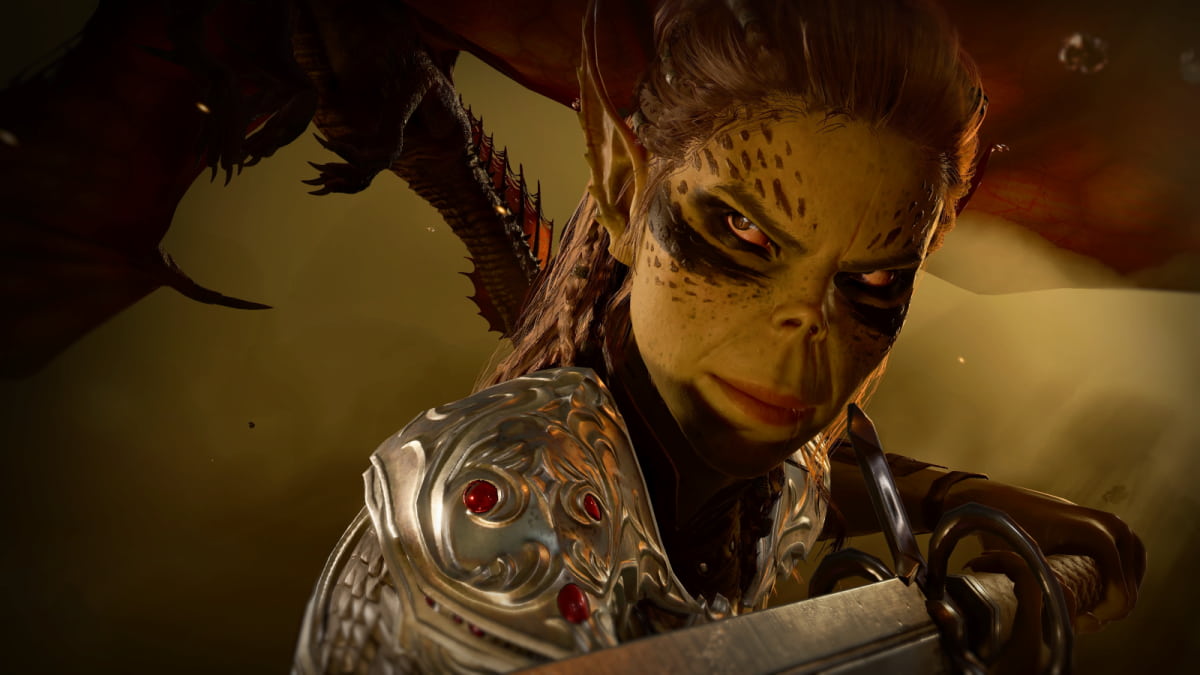
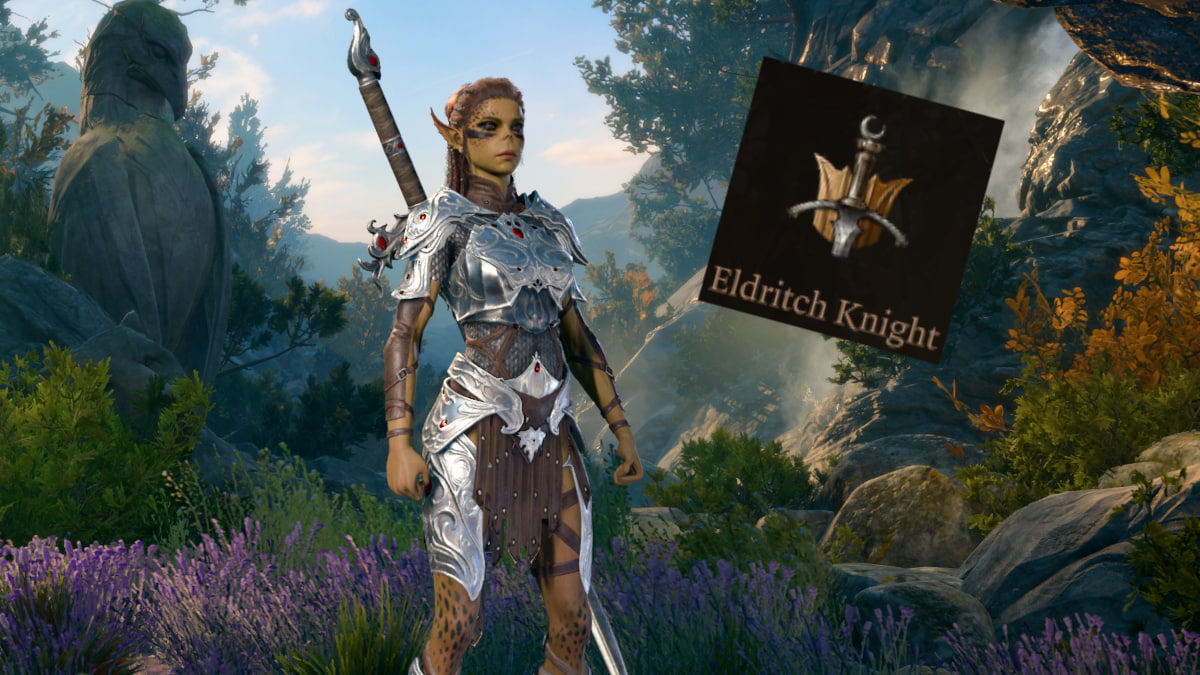

Published: Jan 19, 2024 11:40 am